Unit1 How can we become good learners SectionB 1a-1e 课件+音频(共23张PPT,含内嵌视频)人教版九年级英语全册
文档属性
| 名称 | Unit1 How can we become good learners SectionB 1a-1e 课件+音频(共23张PPT,含内嵌视频)人教版九年级英语全册 | 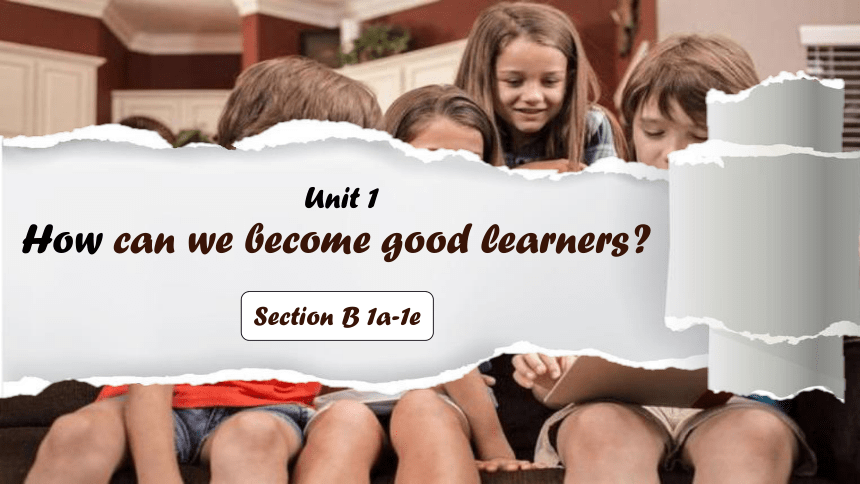 | |
| 格式 | pptx | ||
| 文件大小 | 116.6MB | ||
| 资源类型 | 教案 | ||
| 版本资源 | 人教新目标(Go for it)版 | ||
| 科目 | 英语 | ||
| 更新时间 | 2024-10-12 21:34:58 | ||
图片预览



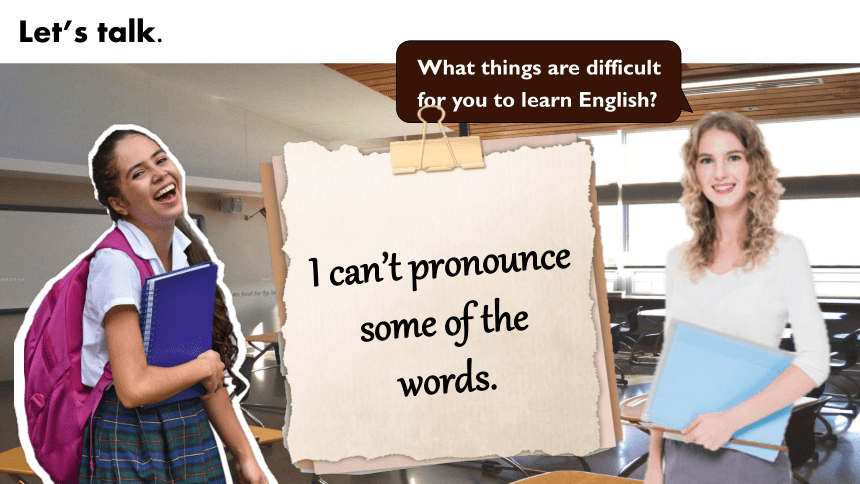
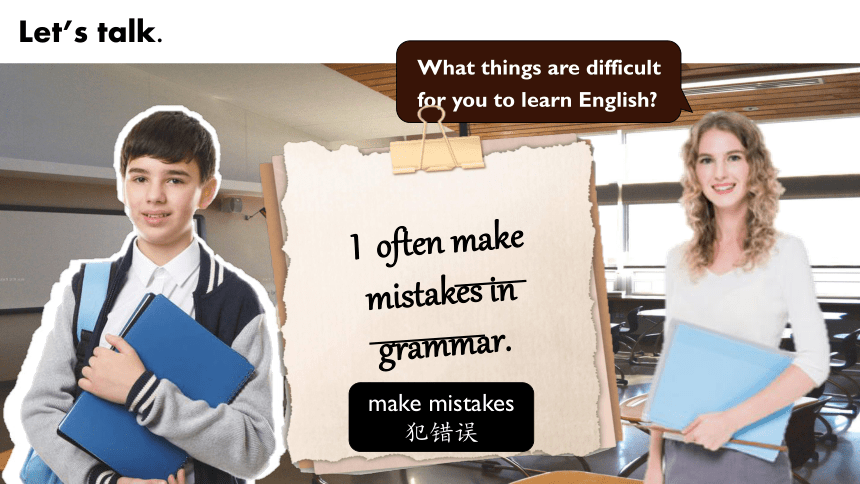
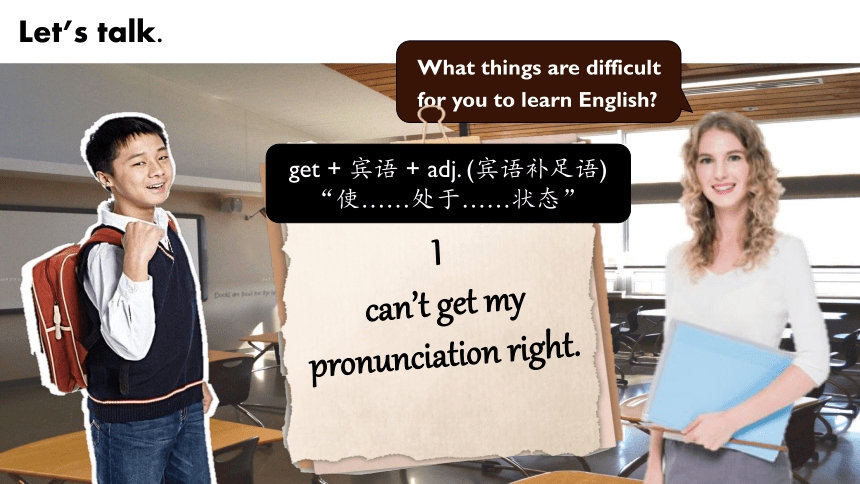
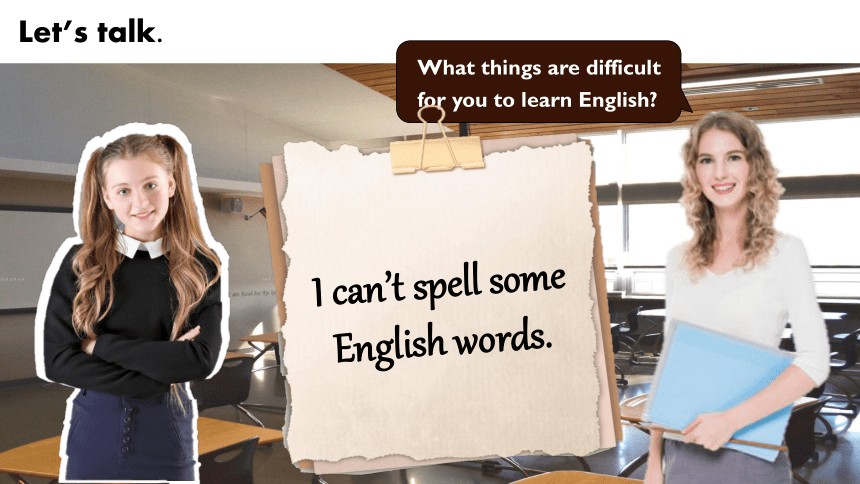
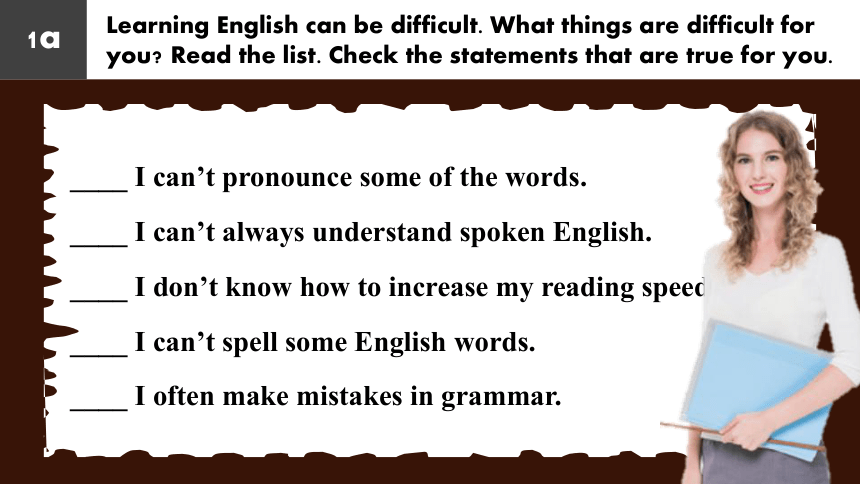

文档简介
(共23张PPT)
Unit 1
How can we become good learners
Section B 1a-1e
Let’s watch a video.
She is talking about the ____________ learners may face when they are learning English and the ____________ to them.
problems
solutions
solution /s lu ( )n/
解决方法
Let’s talk.
What things are difficult for you to learn English
I don’t know how to increase my reading speed.
increase / n kri s/
增加
speed /spi d/
速度
Let’s talk.
What things are difficult for you to learn English
I can’t pronounce some of the words.
Let’s talk.
What things are difficult for you to learn English
I often make mistakes in grammar.
make mistakes
犯错误
Let’s talk.
What things are difficult for you to learn English
I
can’t get my pronunciation right.
get + 宾语 + adj. (宾语补足语)
“使……处于……状态”
Let’s talk.
What things are difficult for you to learn English
I can’t spell some English words.
Learning English can be difficult. What things are difficult for you Read the list. Check the statements that are true for you.
1a
____ I can’t pronounce some of the words.
____ I can’t always understand spoken English.
____ I don’t know how to increase my reading speed.
____ I can’t spell some English words.
____ I often make mistakes in grammar.
What other things are difficult for you Make a list.
1b
________________________________________.
________________________________________.
________________________________________.
I don’t know enough words to write well.
I always forget some new words.
I have poor pronunciation.
Paul finds it difficult to learn English. Listen and complete the learning challenges he talks about.
1c
Challenges
He can’t get the _____________ right.
He _________ a lot of new words.
He can’t always ___________ when people talk to him.
He doesn’t get much __________ practice.
pronunciation
forgets
understand
writing
challenge / t l nd /
挑战
Listen again. Complete the solutions.
1d
Solutions
1. _________ can help.
2. He can always __________________ in his
notebook and review them from time to time.
3. He can __________________________ to practice speaking.
4. He should find a _______ to practice writing.
Listening
write the new words
join an English language club
pen pal
Listen again and fill in the blanks.
1d
Ms. Manson: You look __________, Paul.
Paul: I am, Ms. Manson. I’m having trouble learning English.
Ms. Manson: You said you liked English. What’s the problem
Paul: I can’t get the ______________ right.
Ms. Manson: Well, listening can help. Why don’t you listen to English songs on the radio and __________ the difficult words
Paul: That’s a good idea. But what about all the new words I _________ a lot of the new words.
Ms. Manson: You can always write the new words in your notebook and review them ______________________. You can even study on the subway on the way to school.
worried
pronunciation
repeat
forget
from time to time
repeat /r pi t/
重复
from time to time
偶尔;时不时地
Listen again and fill in the blanks.
1d
Paul: That might really help! Thanks.
Ms. Manson: Can you _______________ when people talk to you
Paul: Well, not always. Sometimes I just don’t understand what people are saying.
Ms. Manson: Why don’t you join an ____________________________ to practice speaking English The English club meets after school on Tuesdays and Thursdays.
Paul: Maybe I’ll go. The only ________________ is that I don’t get much writing practice.
Ms. Manson: Maybe you should find a ___________.
Paul: That sounds like a fun way to practice writing. Thanks, Ms. Manson.
understand
English language club
other problem
pen pal
Fill in the blanks according to the conversation.
1d
Paul have some ___________ learning English and Ms. Manson gives him some _______. First, Paul can’t get the ____________ right. Ms. Manson tells him that __________ is helpful. He can listen to English songs on the radio and _________ the difficult words. Second, Paul _________ some of the new words. Ms. Manson thinks he should write them in his __________ and review them ___________________. Third, sometimes Paul can’t understand what people are saying. Ms. Manson suggests that he should join an ________________ to practice speaking English. The last problem is Paul can’t get much writing practice. Ms. Manson advises that he can find a ____________.
problems
advice
pronunciation
listening
repeat
forgets
notebook
from time to time
English club
pen pal
Role-play conversations using the information in 1c and 1d.
1e
I don’t have a partner to practice English with.
Maybe you should join an English club.
How to give advice
Why not / Why don’t you…
What / How about…
Let’s do sth.
You’d better do sth.
You should do sth.
How should we learn English
Language points
教材例句:
I don’t know how to increase my reading speed.
我不知道怎么提高我的阅读速度。
“疑问词+不定式”结构 。类似的有:what / which / when / where / how + 不定式短语作宾语 ,可与宾语从句转换。
e.g. I don’t know what to do to improve my English grades.
= I don’t know what I can do to improve my English grades.
这种结构在句中可作主语、宾语、表语等。作主语时,谓语动词用单数形式。
e.g. How to deal with it is still a question.如何解决它仍然是一个问题。(作主语)
I don’t know what to have for dinner. 我不知道晚餐吃什么。(作宾语)
The question is which to buy. 问题是买哪一个。(作表语)
Language points
教材例句:
I don’t know how to increase my reading speed.
我不知道怎么提高我的阅读速度。
increase v.“增加;增长;提高”
e.g. The population has increased from 1.2 million to 1.8 million.
人口已从120万增加到了180万。
increase by + 分数、倍数等,意为“增加了……”
e.g. The average salary does indeed increase by 10%.
平均工资实际上增加了10%。
(2) increase to + 具体数字,意为“增加到……”
e.g. The number of students in this school is going to increase to 3000.
这所学校的学生人数将增加到3000人。
Language points
教材例句:
I often make mistakes in grammar.
我经常在语法上犯错误。
mistake n. 错误
make mistakes = make a mistake “犯错”
e.g. Tom didn’t make a single spelling mistake in his composition.
汤姆在这篇作文里一个字也没拼错。
(2) by mistake “意外地”
e.g. He opened Mary’s letter by mistake. 他误拆了玛丽的信。
mistake v. 误会,误解
e.g. I admit that I mistook his intentions.我承认我误解了他的意图。
Language points
教材例句:
He can’t get the pronunciation right.
他不能正确发音。
“get + 宾语 + 宾语补足语”结构,get此处意为“使,让”。
get + 宾语 + adj./adv./介词短语 “让……处于……状态”
e.g. Don’t get your new dress dirty, Lily. 不要把你的新裙子弄脏,丽丽。
(2) get + 宾语 + to do sth.“让……做某事”
e.g. He got his brother to help him. 他让他的弟弟帮他。
(3) get + 宾语 + doing sth.“使……起来”
e.g. I’ll get the car starting. 我会使车子发动起来。
(4) get + 宾语 + done.“让……被做”
e.g. Can you get the work finished in time 你能按时完成工作吗?
Language points
教材例句:
I’m having trouble learning English.
我学英语有困难。
have trouble / difficulty / problems (in) doing sth. “做某事有困难”
e.g. He has trouble / difficulty / problems (in) making friends.
他交朋友有困难。
have fun (in) doing sth. “做某事有意思(有趣)”
have a good time (in) doing sth. “做某事很开心”
have a hard time (in) doing sth. “做某事很辛苦”
Exercises: 用所给词语的适当形式填空。
1. Sometimes, I can’t get the ______________ (pronounce) right.
2. I don’t know how _____________ (improve) my spoken English.
3. The more careful you are, the fewer __________ (mistake) you’ll make.
4. You can find a pen pal to practice ___________ (write).
5. She can’t __________ (spell) English words.
6. Many young people have trouble __________________ (communicate) with their parents.
7. The unemployment rate has increased ____________ three percent.
pronunciation
to improve
mistakes
writing
spell
communicating
by
Exercises:用方框中所给单词的适当形式填空。
1. We must learn to face the __________ in our life.
2. He has trouble in understanding ____________ English.
3. Can you think of a good ___________ to the problem
4. You can listen to the tapes to get much listening ___________.
5. The more careful you are, the fewer ____________ you’ll make.
solution, practice, mistake, speak, challenge
challenges
spoken
solution
practice
mistakes
Unit 1
How can we become good learners
Section B 1a-1e
Let’s watch a video.
She is talking about the ____________ learners may face when they are learning English and the ____________ to them.
problems
solutions
solution /s lu ( )n/
解决方法
Let’s talk.
What things are difficult for you to learn English
I don’t know how to increase my reading speed.
increase / n kri s/
增加
speed /spi d/
速度
Let’s talk.
What things are difficult for you to learn English
I can’t pronounce some of the words.
Let’s talk.
What things are difficult for you to learn English
I often make mistakes in grammar.
make mistakes
犯错误
Let’s talk.
What things are difficult for you to learn English
I
can’t get my pronunciation right.
get + 宾语 + adj. (宾语补足语)
“使……处于……状态”
Let’s talk.
What things are difficult for you to learn English
I can’t spell some English words.
Learning English can be difficult. What things are difficult for you Read the list. Check the statements that are true for you.
1a
____ I can’t pronounce some of the words.
____ I can’t always understand spoken English.
____ I don’t know how to increase my reading speed.
____ I can’t spell some English words.
____ I often make mistakes in grammar.
What other things are difficult for you Make a list.
1b
________________________________________.
________________________________________.
________________________________________.
I don’t know enough words to write well.
I always forget some new words.
I have poor pronunciation.
Paul finds it difficult to learn English. Listen and complete the learning challenges he talks about.
1c
Challenges
He can’t get the _____________ right.
He _________ a lot of new words.
He can’t always ___________ when people talk to him.
He doesn’t get much __________ practice.
pronunciation
forgets
understand
writing
challenge / t l nd /
挑战
Listen again. Complete the solutions.
1d
Solutions
1. _________ can help.
2. He can always __________________ in his
notebook and review them from time to time.
3. He can __________________________ to practice speaking.
4. He should find a _______ to practice writing.
Listening
write the new words
join an English language club
pen pal
Listen again and fill in the blanks.
1d
Ms. Manson: You look __________, Paul.
Paul: I am, Ms. Manson. I’m having trouble learning English.
Ms. Manson: You said you liked English. What’s the problem
Paul: I can’t get the ______________ right.
Ms. Manson: Well, listening can help. Why don’t you listen to English songs on the radio and __________ the difficult words
Paul: That’s a good idea. But what about all the new words I _________ a lot of the new words.
Ms. Manson: You can always write the new words in your notebook and review them ______________________. You can even study on the subway on the way to school.
worried
pronunciation
repeat
forget
from time to time
repeat /r pi t/
重复
from time to time
偶尔;时不时地
Listen again and fill in the blanks.
1d
Paul: That might really help! Thanks.
Ms. Manson: Can you _______________ when people talk to you
Paul: Well, not always. Sometimes I just don’t understand what people are saying.
Ms. Manson: Why don’t you join an ____________________________ to practice speaking English The English club meets after school on Tuesdays and Thursdays.
Paul: Maybe I’ll go. The only ________________ is that I don’t get much writing practice.
Ms. Manson: Maybe you should find a ___________.
Paul: That sounds like a fun way to practice writing. Thanks, Ms. Manson.
understand
English language club
other problem
pen pal
Fill in the blanks according to the conversation.
1d
Paul have some ___________ learning English and Ms. Manson gives him some _______. First, Paul can’t get the ____________ right. Ms. Manson tells him that __________ is helpful. He can listen to English songs on the radio and _________ the difficult words. Second, Paul _________ some of the new words. Ms. Manson thinks he should write them in his __________ and review them ___________________. Third, sometimes Paul can’t understand what people are saying. Ms. Manson suggests that he should join an ________________ to practice speaking English. The last problem is Paul can’t get much writing practice. Ms. Manson advises that he can find a ____________.
problems
advice
pronunciation
listening
repeat
forgets
notebook
from time to time
English club
pen pal
Role-play conversations using the information in 1c and 1d.
1e
I don’t have a partner to practice English with.
Maybe you should join an English club.
How to give advice
Why not / Why don’t you…
What / How about…
Let’s do sth.
You’d better do sth.
You should do sth.
How should we learn English
Language points
教材例句:
I don’t know how to increase my reading speed.
我不知道怎么提高我的阅读速度。
“疑问词+不定式”结构 。类似的有:what / which / when / where / how + 不定式短语作宾语 ,可与宾语从句转换。
e.g. I don’t know what to do to improve my English grades.
= I don’t know what I can do to improve my English grades.
这种结构在句中可作主语、宾语、表语等。作主语时,谓语动词用单数形式。
e.g. How to deal with it is still a question.如何解决它仍然是一个问题。(作主语)
I don’t know what to have for dinner. 我不知道晚餐吃什么。(作宾语)
The question is which to buy. 问题是买哪一个。(作表语)
Language points
教材例句:
I don’t know how to increase my reading speed.
我不知道怎么提高我的阅读速度。
increase v.“增加;增长;提高”
e.g. The population has increased from 1.2 million to 1.8 million.
人口已从120万增加到了180万。
increase by + 分数、倍数等,意为“增加了……”
e.g. The average salary does indeed increase by 10%.
平均工资实际上增加了10%。
(2) increase to + 具体数字,意为“增加到……”
e.g. The number of students in this school is going to increase to 3000.
这所学校的学生人数将增加到3000人。
Language points
教材例句:
I often make mistakes in grammar.
我经常在语法上犯错误。
mistake n. 错误
make mistakes = make a mistake “犯错”
e.g. Tom didn’t make a single spelling mistake in his composition.
汤姆在这篇作文里一个字也没拼错。
(2) by mistake “意外地”
e.g. He opened Mary’s letter by mistake. 他误拆了玛丽的信。
mistake v. 误会,误解
e.g. I admit that I mistook his intentions.我承认我误解了他的意图。
Language points
教材例句:
He can’t get the pronunciation right.
他不能正确发音。
“get + 宾语 + 宾语补足语”结构,get此处意为“使,让”。
get + 宾语 + adj./adv./介词短语 “让……处于……状态”
e.g. Don’t get your new dress dirty, Lily. 不要把你的新裙子弄脏,丽丽。
(2) get + 宾语 + to do sth.“让……做某事”
e.g. He got his brother to help him. 他让他的弟弟帮他。
(3) get + 宾语 + doing sth.“使……起来”
e.g. I’ll get the car starting. 我会使车子发动起来。
(4) get + 宾语 + done.“让……被做”
e.g. Can you get the work finished in time 你能按时完成工作吗?
Language points
教材例句:
I’m having trouble learning English.
我学英语有困难。
have trouble / difficulty / problems (in) doing sth. “做某事有困难”
e.g. He has trouble / difficulty / problems (in) making friends.
他交朋友有困难。
have fun (in) doing sth. “做某事有意思(有趣)”
have a good time (in) doing sth. “做某事很开心”
have a hard time (in) doing sth. “做某事很辛苦”
Exercises: 用所给词语的适当形式填空。
1. Sometimes, I can’t get the ______________ (pronounce) right.
2. I don’t know how _____________ (improve) my spoken English.
3. The more careful you are, the fewer __________ (mistake) you’ll make.
4. You can find a pen pal to practice ___________ (write).
5. She can’t __________ (spell) English words.
6. Many young people have trouble __________________ (communicate) with their parents.
7. The unemployment rate has increased ____________ three percent.
pronunciation
to improve
mistakes
writing
spell
communicating
by
Exercises:用方框中所给单词的适当形式填空。
1. We must learn to face the __________ in our life.
2. He has trouble in understanding ____________ English.
3. Can you think of a good ___________ to the problem
4. You can listen to the tapes to get much listening ___________.
5. The more careful you are, the fewer ____________ you’ll make.
solution, practice, mistake, speak, challenge
challenges
spoken
solution
practice
mistakes
同课章节目录
- Unit 1 How can we become good learners.
- Section A
- Section B
- Unit 2 I think that mooncakes are delicious!
- Section A
- Section B
- Unit 3 Could you please tell me where the restroom
- Section A
- Section B
- Unit 4 I used to be afraid of the dark.
- Section A
- Section B
- Unit 5 What are the shirts made of?
- Section A
- Section B
- Review of Units 1-5
- Unit 6 When was it invented?
- Section A
- Section B
- Unit 7 Teenagers should be allowed to choose their
- Section A
- Section B
- Unit 8 It must belong to Carla.
- Section A
- Section B
- Unit 9 I like music that I can dance to.
- Section A
- Section B
- Unit 10 You're supposed to shake hands.
- Section A
- Section B
- Review of Units 6-10
- Unit 11 Sad movies make me cry.
- Section A
- Section B
- Unit 12 Life is full of the unexpected
- Section A
- Section B
- Unit 13 We're trying to save the earth!
- Section A
- Section B
- Unit 14 I remember meeting all of you in Grade 7.
- Section A
- Section B
- Review of Units 11-14
